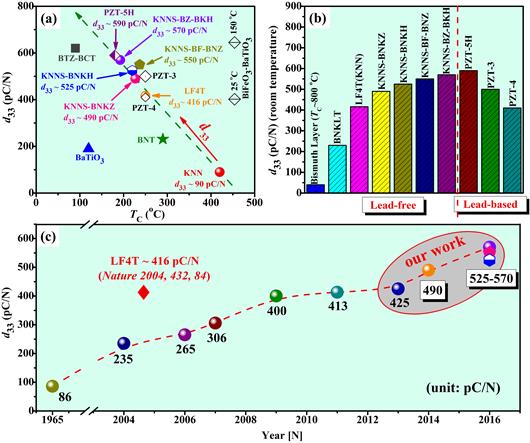
Piezoelectric materials generate electrical signals from the application of a mechanical force or displacement in response to an external electric field. In particular, piezoelectric materials have very important and wide-ranging applications in electronic devices, such as actuators, transducers, and sensors. Up to now, lead-based piezoelectric materials, represented by Pb(Zr,Ti)O3 (PZT), have dominated the electronic device market worldwide, and however the large amount of lead seriously endangers human health and results in terrible environmental pollution. To promote sustainable developments, related laws and regulations have been legislated to prohibit the use of lead in electronic devices, such as “The Restriction of the use of certain Hazardous substances in Electrical and Electronic Equipment” (RoHS). Therefore, it is essential and urgent to fabricate lead-free piezoelectric materials with high performance for practical applications.
Potassium-sodium niobate lead-free piezoceramics have been extensively investigated in the past decade because of their special advantages compared to other lead-free material systems, always considering as a promising candidate for replacing the lead-based ones. The phase boundary strongly influences the piezoelectric activity of perovskite materials, becoming one of the most effective ways to enhance their piezoelectricity. Since 2014, we have achieved a large breakthrough in the piezoelectric activity of potassium-sodium niobate lead-free ceramics by constructing rhombohedral-tetragonal phase boundary [J. Am. Chem. Soc. (2014, 136, 2905, 2016, 138, 15459), Adv. Mater., 2016, 28, 8519]. In particular, the piezoelectric constant of our work is the largest among all reported polycrystalline KNN-based ceramics. Our work can speed up the development of potassium-sodium niobate materials.
In this group, since 2007, more than 150 papers have been published in the field of lead-free ferroelectric and piezoelectric materials as the first author or corresponding author [Chem. Rev., Prog. Mater. Sci , J. Am. Chem. Soc. (two papers), Adv. Mater., Energy Environ. Sci., etc]. All the published papers have been cited more than 2500 times, and H index is 31.
Email: msewujg@scu.edu.cn